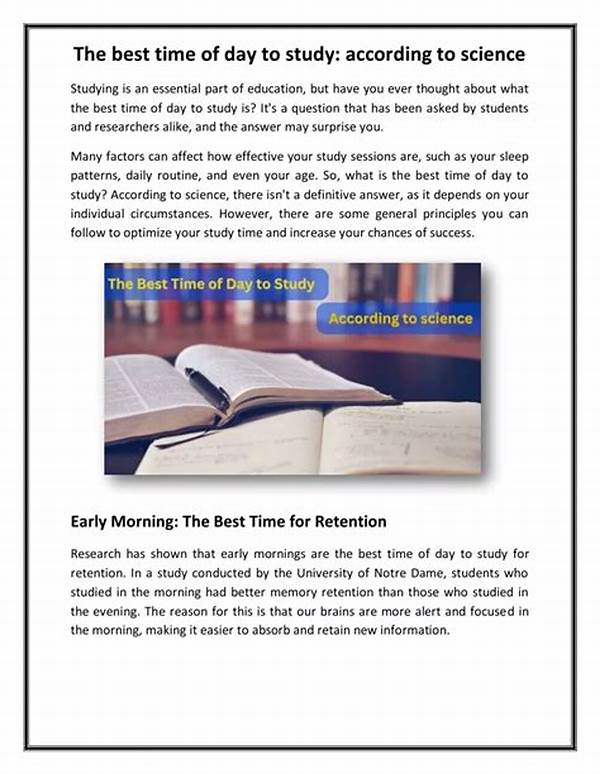I’m here to help craft your content on the fascinating topic of the “best time of day to study according to science.” Let’s delve into the various components you’ve requested.
Read More : Best Flashcard Apps Students Love In 2025
—H1: Best Time of Day to Study According to Science
In the quest for academic excellence, students worldwide are constantly seeking strategies to enhance learning efficiency. Among the plethora of tips available, identifying the best time of day to study according to science has become a pivotal consideration. The debate over optimal study times isn’t just academic folklore—scientific research has delved deep into understanding how our biological clocks influence cognitive performance, retention, and overall learning outcomes.
Consider a typical student’s life: chaotic, filled with distractions, and often pressed for time. Amidst this chaos, choosing when to hit the books can make the difference between productive learning and wasted efforts. The reality is, we’re not all cut from the same cloth; some are morning larks, others night owls, dictated by our circadian rhythms. These rhythms, often referred to as the body’s internal clock, play a vital role in determining our energy levels throughout the day.
Circadian rhythms influence peak learning periods by dictating when we feel most alert and focused. For instance, it’s been observed that our core body temperature, which follows these rhythms, can affect memory recall and attention span. Morning hours, for some, represent a window of opportunity where cognitive functions are at their peak. Conversely, others find their stride in the late afternoon or evening, when the world quiets down and focus sharpens.
The idea of the best time of day to study according to science isn’t just about finding a quiet spot without distractions. It’s about synchronization—aligning study times with your biological prime to maximize output and efficiency. This holistic approach not only makes studying less burdensome but also enhances retention and understanding, laying a solid foundation for academic achievements and beyond.
The Science Behind Optimal Study Times
Studies have shown consistent patterns in when people are able to absorb and retain information most effectively. Research indicates that late morning and early evening are generally when people experience peak cognitive functions, making them optimal for intensive study sessions. Cognitive neuroscience suggests that the brain’s prefrontal cortex, responsible for complex cognitive behavior and decision-making, functions best when rested and rejuvenated.
Our cognitive capabilities aren’t just influenced by the time of day but also by external environmental factors. Natural light exposure, for instance, can influence alertness and proficiency in tasks requiring concentration. It’s no accident that schools have traditionally preferred morning classes, as they capitalize on students’ fresher mental states.
H2: Aligning Study Habits with Circadian Rhythms
Understanding your personal circadian rhythm can serve as a powerful tool. The ability to identify whether you’re a morning person or a night owl can help you schedule study periods that sync with your natural energy peaks. Such alignment not only boosts productivity but also enhances mood and motivation.
Personal testimonies abound in favor of tailoring study schedules to one’s natural inclinations. For example, many students find their productivity soars in the morning after a restful night, allowing them to tackle difficult subjects when their cognitive energy is highest. On the other hand, those who savor the quietude of the night may thrive when distractions dwindle, fostering an ideal environment for focused study.
Now, let’s dive into several components like structure, details, goals, discussions, and more, as requested.
—Structure
The ‘best time of day to study according to science’ is an intriguing subject that ties into various aspects of cognitive and behavioral sciences. Here’s a structured approach to this topic.
H2: Decoding the Optimal Time Slots for Studying
Educational success often hinges on leveraging scientific insights into cognitive performance and its variance at different times of the day. The ‘best time of day to study according to science’ is not merely about personal preferences but rooted in physiological and psychological studies.
The first fact to consider is how our body’s internal clock, or circadian rhythm, governs our daily activities, including peak cognitive functions. Studies highlight that late morning, roughly from 10 AM to noon, is a golden period for most people, as alertness and memory are at their zenith. The body’s temperature is elevated, aiding in the recall of new information.
H3: The Role of Mindfulness and Environment
While timeframes matter, the impact of mindfulness and the study environment cannot be underestimated. A calm, distraction-free setting significantly enhances retention and comprehension. Coupled with awareness of personal energy fluctuations, this duo creates a robust framework for impactful studying.
On the contrary, mid-afternoon is often marked by a slump in energy, sometimes referred to as the ‘post-lunch dip’. This period may not be suitable for learning new, complex material but can be ideal for review sessions or lighter study tasks. Understanding this rhythm allows students to tailor their study plans effectively.
The late afternoon and early evening hours, around 4 PM to 6 PM, often witness a resurgence of energy and cognitive ability, making them another potent timeframe for academic activities. These slots are particularly valuable for problem-solving tasks and critical thinking exercises.
Finally, some students identify most with the night, finding it offers an unmatched ambiance for creativity and deep focus. This shift in energy and mood typically occurs due to fewer distractions and a calming atmosphere, making it conducive for study.
—Details Related to ‘Best Time of Day to Study According to Science’
Purpose and Goals
Understanding the science behind optimal study times serves multiple goals for students and educators alike. Firstly, it aims to debunk the myth that all nighters are as effective as structured study sessions. The best time of day to study according to science provides a clearer picture of when students should dedicate their efforts to maximize learning outcomes.
By aligning studying schedules with biological peaks, students can experience improved retention and comprehension. This strategic learning not only saves time but also reduces stress, creating a more holistic and balanced approach to education. Knowing when to study is as crucial as knowing how to study.
Moreover, for educators, this knowledge allows for the design of schedules and curricula that embrace students’ natural learning windows. Classes and exams can be strategically timetabled to harness peak cognitive hours, enhancing overall academic performance across the board.
Ultimately, the goal is to foster an environment where learning isn’t just about cramming information but about nurturing curiosity and a deep understanding of subjects. Recognizing the ‘best time of day to study according to science’ can set students on a path of lifelong learning, equipped with the skills to prioritize tasks and manage time effectively.
Discussion on Best Time of Day to Study According to ScienceH2: Timing Your Study Sessions for Maximum Gains
The modern student faces an array of distractions, from buzzing smartphones to endless social media notifications. By zeroing in on the best time of day to study according to science, students can shield themselves from these distractions and focus their energy where it counts the most.
There’s scientific logic underpinning the belief that late morning to early afternoon holds potential for superior cognitive performance. During these windows, the brain is not only more alert but also better equipped to tackle complex subjects and new areas of study. It’s a matter of riding the biological wave of focus and utilizing it for academic endeavors.
Mid-afternoon, however, often signals a lull in productivity. Known colloquially as the ‘afternoon slump’, this period is characterized by drowsiness and decreased alertness. Students are encouraged to use these hours for activities that demand less cognitive engagement, such as reviewing notes or organizing future study sessions.
H3: Personalization of Study Schedules
As the clock ticks toward the evening, many students experience a renewal of focus and creativity. This phase can be particularly advantageous for studies that require critical thinking and problem-solving, given the reinvigoration of mental faculties during this time.
Finally, understanding that students are diverse in their circadian preferences is key. Some flourish under the moonlight, finding the night offers a unique environment conducive to concentration and profound reflection. The quiet hours post-dusk are far from universally beneficial, but for those who respond well, night-time study sessions can prove incredibly effective.
In conclusion, while the best time of day to study according to science provides a general framework, individual preferences must not be overlooked. Personalization of study habits regards these scientific insights while adapting them to fit personal circadian rhythms and lifestyle choices. Finding your stride in this balance can supercharge your learning efficiency and success.
—Explanations on Best Time of Day to Study According to ScienceH2: Key Considerations for Timing Study Sessions
Descriptive Analysis
The topic of the best time of day to study according to science encapsulates a fascinating intersection of biology, psychology, and education. While scientific studies provide a basis for optimal study periods, real-world application calls for personalized adjustments. Emphasizing rest and rhythm, the conversation encourages students to reflect on their individual energy patterns and logistical constraints.
Educational institutions striving to improve student performance can greatly benefit from integrating these insights into academic planning. It’s not just about maximizing learning efficiency; it’s about cultivating a culture of informed studying that respects students’ natural learning ebbs and flows. This tailored approach further encourages students to develop a deeper understanding and love for learning.
To wrap it up, the journey of understanding when to study is as valuable as the study itself, guiding students to act smarter, not harder. The ‘best time of day to study according to science’ is not a one-size-fits-all answer but an invitation to explore and leverage personal strengths and preferences to achieve educational greatness.
Short ArticleH2: Discovering Your Ideal Study Times
Navigating the academic landscape can be daunting, but leveraging the best time of day to study according to science can provide a blueprint for success. It’s about marrying science with personal insights to discover when your brain is primed for peak performance. This not only maximizes learning efficiency but also revamps the entire educational experience into something more holistic and enjoyable.
Understanding your own circadian rhythm can unlock the secret to timed productivity. While studies highlight late morning as a key period for cognitive activities, individuals are urged to pay attention to their own energy fluctuations to find their personal sweet spot for studying. Aligning study sessions with natural energy peaks leads to improved retention and deeper understanding of complex material.
H3: Strategic Planning for Studying
Strategic study planning emphasizes working smarter rather than harder. Recognizing the natural energy lull during mid-afternoon can help students redirect their focus to lighter tasks, preserving mental energy for later hours. Similarly, late afternoon resurgence in mental clarity can be tapped into for problem-solving tasks.
Even the night holds potential for those naturally inclined to operate better under a starry sky. It boils down to understanding and respecting these individual differences that determine when the brain is most receptive to new information.
Practical application of these insights can be transformative. By tailoring study habits to one’s natural rhythm, students aren’t just preparing for exams—they are cultivating a sustainable approach to learning that values quality over quantity, endurance over short spurts of frenetic activity.
In the end, while scientific studies offer a foundation, the ultimate recommendation is to engage in active self-experimentation. Discovering the best time of day to study according to science is a dynamic and personal journey, involving frequent adjustments and real-time observations of one’s mental states. This journey heralds not just academic success but a more profound enjoyment and appreciation of the learning process.


